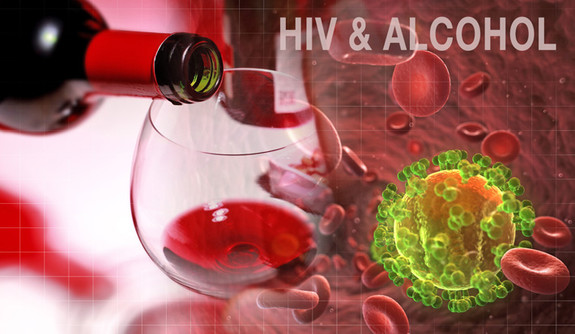Sourec: Thailand Medical News Oct 25, 2019 6 years, 4 months, 1 week, 22 hours, 55 minutes ago
Alcohol consumption of any kind even in small amounts have been shown to be harmful to the health of those with
HIV according to a study done by the Boston University School Of Medicine. Alcohol is linked to alterations in immune function among people with
HIV.

Despite it being known for a long time that
alcohol impacts immune function, it's been unclear the effect of
alcohol on immune function in the context of
HIV, a disease whose progression is dependent on immune dysfunction until this new study.
Medical researchers from Boston University School of Medicine (BUSM) looked at biological markers of innate immune function, a kind of immune response that acts quickly and non-specifically to new infections and pathogens.
They team investigated biological markers of three specific immune processes: systemic inflammation, monocyte activation and altered coagulation. Higher levels of biological markers for these processes have previously been associated with higher risk of death.
In this new study, the researchers assessed self-reported
alcohol use over time (three times over two years) and also measured alcohol use using a blood-based marker of
alcohol consumption called PEth (phosphatidylethanol) that detects
alcohol consumption up to about 21 days after drinking. Additionally, they measured other behaviors and health conditions that could obscure the true relationship between
alcohol consumption and these biomarkers.
Dr Kaku So-Armah, PhD, assistant professor of medicine at BUSM commented in an interview with
Thailand Medical News, "We found that people who reported drinking
alcohol or had high PEth had higher levels of these biomarkers of immune function. The fact that
alcohol consumption was linked to elevated levels of these biomarkers, which are linked to mortality, suggests that alcohol may be contributing to mortality risk through immune dysfunction among people with
HIV."
According to the medical researchers, it is important to note they observed elevated levels of these biomarkers of immune activity in a relatively young
HIV population with a low occurrence of chronic inflammatory diseases of aging like diabetes, obesity or renal disease.
The said, "Further we observe
d that the relationship between
alcohol consumption and some of these biomarkers was not linear, suggesting a complex relationship between alcohol use and biomarkers of systemic inflammation and monocyte activation."
While the researchers stress that this is an observational study and the findings do not prove causality, they hope the study highlights the harms associated with heavy
alcohol consumption among people living with
HIV.
It was also shown that even small amounts or once in a few months consumption of any kind of
alcohol, be it beer, wine or even hard liquor like whisky or brandy had the same effect on the immune system of
HIV patients.
Reference: Association between alcohol use and inflammatory biomarkers over time among younger adults with HIV—The Russia ARCH Observational StudyKaku A. So-Armah ,Debbie M. Cheng,Matthew S. Freiberg,Natalia Gnatienko,Gregory Patts,Yicheng Ma,……..Published: August 22, 2019 PLoS One Journal https://doi.org/10.1371/journal.pone.0219710
